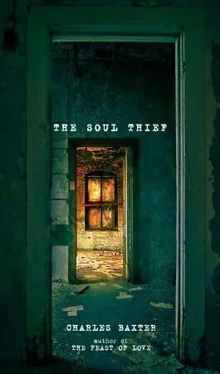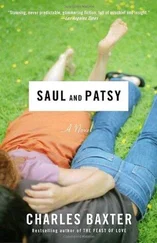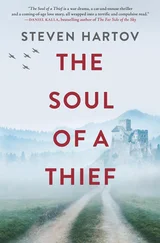“Oh, yeah, the classes are fine.”
“Good. Your mother’s good. She misses you. Your sister’s all right, too.”
That “all right” also has a touch of the disingenuous itself, Catherine’s condition being timeless and unreconciled to reality. Having refused to give up her lifelong mourning, she lives outside of Milwaukee in a small group home with a view of Lake Michigan. There, minded by salaried employees, she passes a contemplative life colored by the narrow spectrum of apathy, except for episodes at the piano. She has been given antidepressants, sedatives, and stimulants, but still she does not speak. She reads, or seems to: she glares at the words and turns the pages with impatient finger flicks. Occasionally she peeps and squeaks. But when she sits down at the keyboard, she plays with a rather frightening virtuosity, though without any recognizable human feeling — the music emerges from the instrument with the dead expressionism of a player piano switched on in an empty room. Catherine’s face remains vacant no matter what musical notation passes in front of her or what her fingers find to do to occupy the time.
The subject of the job market removes Catherine from the conversation, and soon his stepfather tells Nathaniel that he has to go back to work. If this were a real crisis, the old man would stay on the line, but for him identity has nothing to do with money or with how the world actually works, and that is that.
“Thanks, Pop,” Nathaniel says. He puts down the phone and looks around at the comfortable dinginess of his apartment, now, thanks to the absence of valuables, unburglarizable. Outside the window, a cardinal chirps frantically as if affrighted. Nathaniel would like to snap off his imagination and its multiple narratives, but it’s stuck in the ON position, and if he didn’t live in his imagination half the time, he wouldn’t be himself, and he wouldn’t be bothered by Coolberg. Maybe he wouldn’t be bothered by anything, period. He would live on the Blessed Isles.
He leans forward to gaze out the window. He sees his own reflection in the glass. What good is an identity, anyway? his reflection asks him. For that matter, what good is a reflection? I lived in Wisconsin before I lived in New York, he tells the reflection, these were my parents, I broke my arm when I was twelve and Brian Hennerley tackled me when we were playing touch football, I first kissed a girl when I was fourteen, I remember she was ticklish …the rubble of the personal, the dust motes of the specific. Who cares who you are? the reflection asks, pointing at him. Every identity consists of a pile of moldering personal clichés given sentimental value by the fact that someone owns them. The fallacy of the unique! A rubbish heap of personal data, anybody’s autobiography. You can’t sell it or trade it. Besides, everyone has an autobiography, the principle of inflation thereby causing each one to be worthless.
Well, okay, the reflection admits, maybe some identities do shape up better than others thanks to the clothing of grace and good fortune. Of course, of course, of course, of course. Some identities are significantly richer than others, you’d have to be a fool to deny it. Better, more magnificent sins enacted on satin sheets in the penthouse, with music piped in through the floor grates along with the perfume, lend a certain robust glory to a man’s memory trove. Whereas some existences are empty dry sockets giving off the radiation of pain, victimization, mere shadows on the wall, dim bulbs, lethal vicissitudes, black holes in space, gigantic gravitational vacuums piloted by hungry ghosts…
Nathaniel finds that he is sweating again as these gigantic formless concepts tumble out of the window glass’s reflection into him, taking up mental occupancy. The unpleasantness of these ideas causes him to radiate a nervous malodorous sweat that he himself can smell and be offended by, and to remedy the smell of himself, he rushes to his closet to put on a clean shirt. He searches among the hangers and in the dresser drawers for the blue Brooks Brothers that his sister gave him, once upon a time, the one with thin rust-colored vertical stripes and a button-down collar, the shirt that always cheers him up, the wonder-working shirt. Wearing it makes him into a serious man, what they used to call a man of parts. Outside, snow has started to fall and is tapping against his bedroom’s window glass. The cardinal is no longer chirping, his reflection has disappeared, and the shirt’s not here — it has gone conspicuously missing. The dresser drawer advertises its own emptiness. And what about the white shirt his stepfather gave him, the one tailored in Italy, the elegant Fratelli Moda? What about that one? That one isn’t here either.
Where did they go? Who would burglarize two shirts?
Where are my shirts?
AT ONE OF THE TABLESin the dining area of the People’s Kitchen sits Ben the Burglar, alone, slurping his soup. He wears a red cap. He eats with his gloves on, spoon in his right hand, lit cigarette in his left. Today he sports a pair of old tortoiseshell glasses, a 1940s look, that of a chump in a downtown diner wearing a cheap disguise, behind which his junkie eyes peer at his fellow citizens. A bruise shines from the left side of his jaw. Deep film-noir shadows fall on him; blue smoke rises from his head. It is four o’clock in the afternoon, and Nathaniel sits down next to him uninvited.
“Whad I do this time?” Ben asks without looking up. He swallows, then takes a puff from the cigarette.
“I’m missing two shirts,” Nathaniel says. “I think you know where they are.”
“Would you let me finish?” Ben slows down the eating process, savoring each bite of potato, carrot, and stew meat. Why hasn’t he taken off his gloves? He needs a gangster affectation.
“You broke into my place again. That was unfair.”
“So?” Ben smiles. “You didn’t mind when I did it before.” Confessions of misdeeds apparently emerge easily from this hard-boiled guy. Like any tradesman, he takes pride in his work and in a job successfully accomplished. He smiles coldly, blowing smoke upward toward the ceiling. It is an era when people still know how to smoke and eat at the same time.
“So why did you take those shirts?”
“You forgot to lock the door again, for starters. I took a pair of pants, too,” Ben says thoughtfully. “And a pair of shoes.”
He’s now madly grinning with self-love. Also, his speech has slowed down, an effect caused by the good life of cigarettes, food, and opiates. For him, heroin is to experience what salt is to rice. It makes it palatable.
“How come you took them?”
“ How come? I was on commission.”
“You were what ?”
“You’re funny when you pretend to be deaf.” Ben gazes up at the ceiling with merriment. His eyes mist over. Life is one long spree. He taps out ash on the coffee cup’s saucer, then rotates the cigarette’s tip on the china, a delicate gesture suitable for a dollhouse.
“On commission from whom?”
“‘Whom.’ I like that.” He shakes his head in admiration. “You sure got yourself a good education somewhere.”
“Oh, fuck you, Ben.”
“Okay, there you go, fuck me,” Ben replies, rubbing his chin violently before lifting his eyebrows to express radical innocence in the line of questioning from this overeducated spoilsport. After taking one last long drag from his cigarette, he stubs it out on the saucer and exhales smoke through his teeth. He resumes foraging in the bottomless bowl of soup, prolonging the moment to excruciation, a delay that evidently delights him, because he smirks. Now, with his left gloved hand, free of the cigarette, he lifts a piece of bread, taking a delicate bite. The bread has been slathered with butter, and butter affixes itself to his chin, giving him the look of a polished wooden marionette.
Читать дальше












